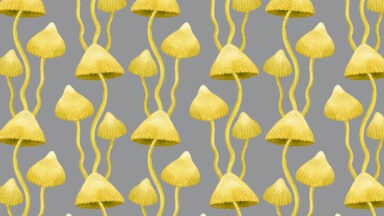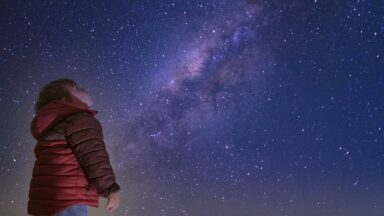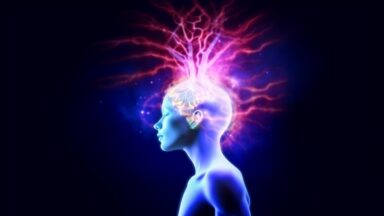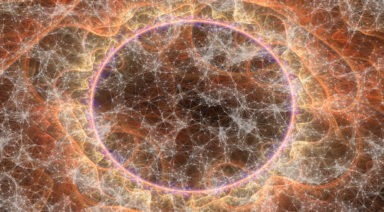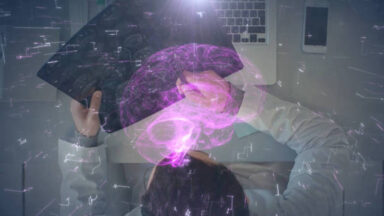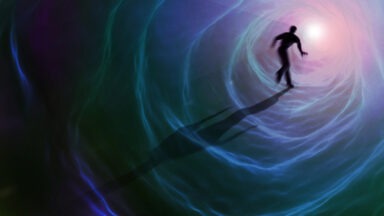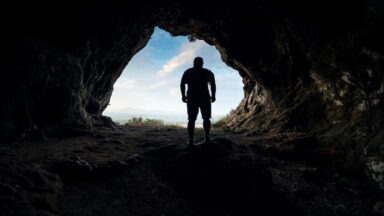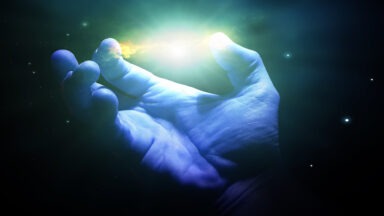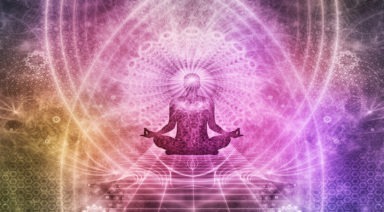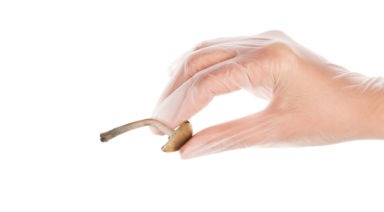Comic Bill Hicks’ Excellent Inter-Dimensional Adventure
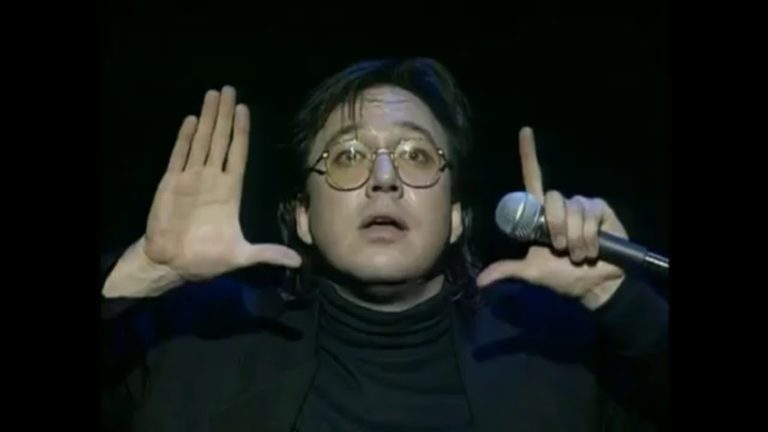
Comic Bill Hicks was described as “irreverent, outrageous, shocking, angry,” and “genius.” He loathed media-entrained helplessness and consumerism, referring to America as the “United States of Advertising.” Called the “comedian’s comedian” by critics, Hicks performed in the U.S., U.K., and Australia until his death in 1994 at age 32.
But the adjectives above cannot fully describe Hicks, who waged war on the cultural trance, calling for a new, awakened consciousness. He was a rock n’ roll Gabriel on the razor’s edge, trumpeting a vision of a vast, human evolutionary shift. Look and listen between the lines and other descriptors will come to mind; “visionary,” “prophetic,” and yes, “dimensional traveler.”
One of Hicks’ alter egos, “Goat Boy,” was a startling stew of Pan, Dionysus, Bacchus, and any hedonistic diety you can think of. Goat Boy was the comic gestalt of Hicks’ libido — seriously explicit, but paradoxically wise and child-like. Gerald Nachman, the San Francisco Chronicle theater critic wrote, “However rough he gets, I felt my head opened up by Hicks. He’s not everyone’s cup of chicory, but If you like your comics witch’s brew-strong, Bill Hicks is the wit of choice.”
Harmonic Convergence 1987
As a teenager, Hicks and his friends discovered psilocybin mushrooms as a tool for spiritual insight. From an even earlier age, Hicks had explored eastern meditation traditions and subjects in the “Course in Miracles” genre. He earnestly and sincerely sought enlightenment, say his surviving friends. And he believed unshakably in UFOs and multi-dimensionality.
Laser-focused on a career as a comedian, Hicks began sneaking out of his parent’s house to perform in a Houston comedy club at age 14. By 1985, he was established as the leader of the pack of the Houston comedy scene. Hicks was living like a rockstar; drugs, alcohol, wild parties, etc., and over the next few years, he fell into addiction and behaviors that impacted his career and was losing credibility as an artist and performer.
“Bill knew he needed to get sober. From a career standpoint, it became apparent he needed to turn things around,” wrote friend Kevin Booth in his book. But according to Booth, now a filmmaker and producer, the 1987 Harmonic Conversion event was the turning point. The event was organized by author Jose Arguelles, the Aug. 16, 1987 date was chosen because of planetary alignments and the Mayan calendar. Hicks, Booth, and another friend prepared days in advance with meditation and clean diets.
The day of the convergence, the group ended up at another friend’s ranch sitting near a pond. Booth and Hicks had both taken large doses of psilocybin mushrooms — called a “heroic” dose by Terence McKenna — intending to “punch a hole” through the fabric of reality.”
After talking about relativity for a while, Hicks and Booth found themselves inside a ship that was like a conch shell with neither fully realizing the other was having the same experience “In his book, “Bill Hicks: Agent of Evolution,” Booth writes:
“We headed towards a circle of light. The beings, they were glowing. Bill was asking questions like; ‘Why are you here? Why is this happening?’
“I came out with explanations of time travel and a firm belief that the barriers to time travel and communication were all inside your mind. Basically, anything was possible. Immediately after leaving the ship, we said a few words.
KEVIN: Oh my god. Did you…?
BILL: Yes.
“Then we realized we were able to communicate telepathically. We had a perfectly normal conversation without either one of us opening our mouth. We were perfectly in sync. It was like a miracle. We communicated like this for a while, neither of us speaking anything.”
Booth adds that after, Hicks started talking about the experience from the stage. “He saw the source of light that exists in all of us,” says Booth. Still a combination of barbed wire and silly putty, Hicks began to conclude his shows with a new message (excerpted) and spoke of one god with the name of ‘love.’
“The world is like a ride in an amusement park, and when you choose to go on it you think it’s real because that’s how powerful our minds are. Many people have been on the ride a long time, and they begin to wonder, ‘Hey, is this real, or is this just a ride?’”
“We can change it anytime we want. It’s only a choice. Just a simple choice, right now, between fear and love. Here’s what we can do to change the world, right now, to a better ride. Take all that money we spend on weapons and defense each year and instead spend it feeding and clothing and educating the poor of the world, which it would pay for many times over, not one human being excluded, and we could explore space, together, both inner and outer, forever, in peace.”
Booth has long been at the center of a theory that Hicks faked his death and became the conspiracy theorist Alex Jones, in part because Booth went to work for Jones shortly after Hicks’ death. When asked via email, he did not respond.
Hicks’ words are as fresh today as they were in the early ‘90s. When watching Hicks’ Youtube performances, it’s easy to forget the material is 25-plus years old.
Hicks died of pancreatic cancer at the unusually young age of 32 — this is not a young person’s disease. But ensuing generations have embraced his vision and message. “Zeitgeist,” a powerful 2007 documentary that examines the mass illusions created by prevailing institutions, features Hicks at the conclusion.
Hicks never wavered from his vision of the next turning of human evolution and his aspirations for unity and peace. But his performances also revealed his anguish, derived in part from humanity’s cruelty to itself. His angst may be described by Robert Anton Wilson’s insight in his book “Prometheus Rising.”
“We are all giants, raised by pygmies, who have learned to walk with a perpetual mental crouch,” and echoed in G.I. Gurdjieff’s words, “Fairness? Decency? How can you expect fairness or decency on a planet of sleeping people?”
Study Shows Psilocybin Promotes New Growth of Neurons in Brain
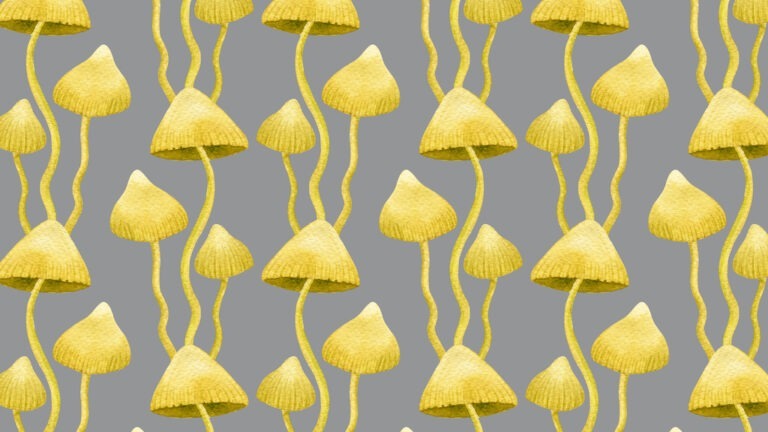
A major development in the treatment of depression shows psilocybin can actually grow connections inside the brain without a hallucinogenic trip.
As we have previously reported, researchers have found that psilocybin, the active ingredient in psychedelic mushrooms can reduce major depressive disorder in humans. but we have not known how it works or how long it will last.
Now a new study out of Yale University shows one dose of psilocybin in mice creates rapid and sustained connections between neurons.
Steven Grant Ph.D. Director of Research at the Heffter Research Institute, a non-profit organization a non-profit organization that promotes research into hallucinogens and the brain, has studied how drugs affect the brain for nearly 50 years.
“So, what they discovered, not only does a single dose of psilocybin produce the formation of neuronal growth as measured by what are called ‘spines,'” Grant said. “Spines are the little nubby protrusions off the branches of a neuron that are associated with the connections with other neurons, so presumably the more spines the more connections you have. And the study found that psilocybin not only produced growth in the number of spines, but it persisted over a month. So that’s remarkable — one dose produces this long-lasting change in the ability of the neurons to form new connections.”


